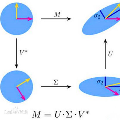Mobile edge computing (MEC) has been regarded as a promising technique to support latencysensitivity and computation-intensive serves. However, the low offloading rate caused by the random channel fading characteristic becomes a major bottleneck in restricting the performance of the MEC. Fortunately, reconfigurable intelligent surface (RIS) can alleviate this problem since it can boost both the spectrum- and energy- efficiency. Different from the existing works adopting either fully active or fully passive RIS, we propose a novel hybrid RIS in which reflecting units can flexibly switch between active and passive modes. To achieve a tradeoff between the latency and energy consumption, an optimization problem is formulated by minimizing the total cost. In light of the intractability of the problem, we develop an alternating optimization-based iterative algorithm by combining the successive convex approximation method, the variable substitution, and the singular value decomposition (SVD) to obtain sub-optimal solutions. Furthermore, in order to gain more insight into the problem, we consider two special cases involving a latency minimization problem and an energy consumption minimization problem, and respectively analyze the tradeoff between the number of active and passive units. Simulation results verify that the proposed algorithm can achieve flexible mode switching and significantly outperforms existing algorithms.
翻译:据认为,移动边缘计算(MEC)被认为是一种大有希望的技术,可以用来支持延时敏感度和计算密集度,但是,随机通道消退特性造成的低卸载率在限制MEC的性能方面成为了一大瓶颈。幸运的是,可重新配置的智能表面(RIS)可以缓解这一问题,因为它能够提高频谱和能源效率。与采用完全活跃或完全被动的RIS的现有工作不同,我们建议采用一种新的混合的RIS,其中反映单位可以灵活地在主动模式和被动模式之间转换。为了在延时和能源消耗之间实现平衡,通过尽量减少总成本,形成了一个优化问题。鉴于这一问题的易感性,我们开发了一种基于优化的迭代算法,将连续的convex近似法、变式替代法和单值解析法结合起来,以获得次优化的解决办法。此外,为了更深入地了解问题,我们考虑两个特殊的案例,涉及软度最小化问题和能源消耗问题,并分别分析主动和被动式运算法模式之间的大幅度转换。



